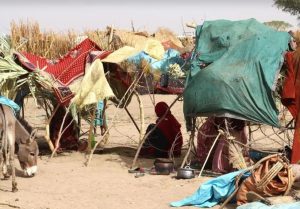Is the right to asylum disappearing?
The right to asylum is enshrined in the 1951 Refugee Convention, which was a response to the aftermath of WWII which saw millions of refugees displaced and in need of protection.
The convention – and a later amendment known as the 1967 Protocol – set out who could be defined as refugees under international law and what their rights are. This includes a key principle known as non-refoulement, which bars countries from sending people back to territories where they fear harm.
Almost 150 countries have ratified the Refugee Convention or the Protocol, or both, and many have also enshrined the right to seek asylum in their own national laws.
 But across the globe, there a plethora of evidence of a weakening and often a disappearance of the right to claim asylum.
But across the globe, there a plethora of evidence of a weakening and often a disappearance of the right to claim asylum.
Allan Rock, a member of the World Refugee and Migration Council and former Canadian ambassador to the UN says: “Doors are closing, and the language is coarsening. Hearts are hardening, walls are being built”.
“Access to asylum has been eroding significantly since at least the 1990s and precipitously so of late,” Mr Rock said.
Italy‘s far-right government has declared a six-moth state of emergency following a rise in the number of migrants crossing the Mediterranean Sea.
Italy is refusing to allow boats carrying migrant to dock in its ports.
The British government, meanwhile, came under fire recently over a ‘memorandum of understanding’ signed with Rwanda to allow it to send asylum seekers to the African nation to have their claims heard there – more than 7,000km away.
European countries also have spent tens of millions of dollars to equip and train the Libyan coastguard in a move to stem the flow of asylum seekers using Libya as a jumping-off point to try to reach Europe by sea.
Tens of thousands have died or disappeared making crossings in recent years.
In North America, Canada last month renewed a deal with the US that effectively allows it to shut the door on most asylum seekers who cross the US-Canada land border and send them back to the United States, even if they have reached Canadian territory.
In the US, the Biden administration has proposed a policy that refugee activists have called an “asylum ban”. The plan would block asylum seekers who arrive at the US-Mexico border from accessing protection in the US if they didn’t first apply for asylum in Mexico or another country along their journeys.
Sentiment appears to be turning against refugees elsewhere in world, with a number of countries closing their borders to people fleeing conflict.
About 250,000 Afghan asylum seekers have arrived in Pakistan since August 2021, but a migrant crackdown has left many of them in fear of being jailed or deported.
More than 600 Afghans have been deported from Pakistan recently, and hundreds more face expulsion in a renewed crackdown on migrants.
More than 240,000 Afghan refugees have been deported from Iran and Turkey since the start of the year, according to local reports.
Authorities in Afghanistan’s south western province of Nimroz, which shares borders with both Iran and Pakistan, told local media that nearly 190,000 Afghans have been deported by Tehran in the last six months alone.
Meanwhile, Turkish police have been accused of trying to push Afghans back towards the Iranian border, but most of their deportations take place via commercial and charter flights on private and government-run Afghan airlines.
According to the Turkish interior ministry’s migration management office, around 92,600 undocumented Afghans have entered the country as of last month
Of those, more than 57,000 were sent back to Taliban-run Afghanistan on both chartered and scheduled flights.
The vast majority – 41,000 – were sent back on 217 chartered flights, an increase of 212 percent on the previous year.
Aid agencies say that Iran, Turkey and Pakistan continue to deport Afghans back to a country facing a mounting humanitarian crisis, despite the fact that none of them recognise the Taliban’s Islamic Emirate as the official government of Afghanistan.
Meanwhile, Rwanda has said it can no longer offer refuge to people fleeing violence in the Democratic Republic of the Congo (DRC) – a move likely to exacerbate already high tensions between the central African neighbours.
Persistent fighting in the east of the mineral-rich DRC has seen federal troops engaged in bitter fighting with rebels from the M23 group, which has seized large amounts of territory.












